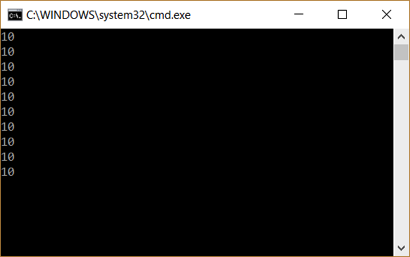Recently, I asked what would be the execution result of the following code:
using System.Threading.Tasks;
using static System.Console;
class Program
{
static void Main()
{
for (var i = 0; i < 10; i++)
{
Task.Factory.StartNew(() => WriteLine(i));
}
ReadLine();
}
}
So, here it is:

At first view, it seems weird, as you may well have expected to see unique values from 0 to 9. Instead, the same value is printed out multiple times. What is going on?
We need to talk about closures
The reason why the execution result of the previous code was ten 10s on the screen lies with the closure. Are you familiar with this concept? If not, please, read this article.
The compiler will make the value of the variable i (which is in the stack) available to the lambdas capturing the local variable and placing it into a compiler-generated object on the heap. That object will be referenced inside of each lambda.
.method private hidebysig static
void Main () cil managed
{
// Method begins at RVA 0x2050
// Code size 71 (0x47)
.maxstack 3
.entrypoint
.locals init (
[0] class Program/'<>c__DisplayClass0_0',
[1] int32
)
// (no C# code)
IL_0000: newobj instance void Program/'<>c__DisplayClass0_0'::.ctor()
IL_0005: stloc.0
IL_0006: ldloc.0
// for (i = 0; i < 10; i++)
IL_0007: ldc.i4.0
// (no C# code)
IL_0008: stfld int32 Program/'<>c__DisplayClass0_0'::i
IL_000d: br.s IL_0036 // loop start (head: IL_0036)
// Task.Factory.StartNew(delegate
// {
// Console.WriteLine(i);
// });
IL_000f: call class [System.Runtime]System.Threading.Tasks.TaskFactory [System.Runtime]System.Threading.Tasks.Task::get_Factory()
IL_0014: ldloc.0
IL_0015: ldftn instance void Program/'<>c__DisplayClass0_0'::'b__0'()
// (no C# code)
IL_001b: newobj instance void [System.Runtime]System.Action::.ctor(object, native int)
IL_0020: callvirt instance class [System.Runtime]System.Threading.Tasks.Task [System.Runtime]System.Threading.Tasks.TaskFactory::StartNew(class [System.Runtime]System.Action)
IL_0025: pop
IL_0026: ldloc.0
IL_0027: ldfld int32 Program/'<>c__DisplayClass0_0'::i
IL_002c: stloc.1
IL_002d: ldloc.0
IL_002e: ldloc.1
// for (i = 0; i < 10; i++)
IL_002f: ldc.i4.1
// (no C# code)
IL_0030: add
IL_0031: stfld int32 Program/'<>c__DisplayClass0_0'::i
IL_0036: ldloc.0
IL_0037: ldfld int32 Program/'<>c__DisplayClass0_0'::i
// for (i = 0; i < 10; i++)
IL_003c: ldc.i4.s 10
IL_003e: blt.s IL_000f
// end loop
// Console.ReadLine();
IL_0040: call string [System.Console]System.Console::ReadLine()
IL_0045: pop
// (no C# code)
IL_0046: ret
}
// end of method Program::Main
As the local variable is declared outside the loop body, the capture point is, therefore, also outside the loop body. A unique object will be instantiated! As a single object is used to store all the increments of the variable, each task will share the same closure object. Considering that the first task will start to run after the loop is completed, the value of the variable will be 10. Got it?
But, how to print out all the numbers from 0 to 9, not necessarily in order? Here is the answer:
using System.Threading.Tasks;
using static System.Console;
class Program
{
static void Main()
{
for (var i = 0; i < 10; i++)
{
var varToCapture = i;
Task.Factory.StartNew(() => WriteLine(varToCapture));
}
ReadLine();
}
}
Now, the capturing point occurs inside the loop. In this way, a new (and different) object will be instantiated for each task.
Nice!







